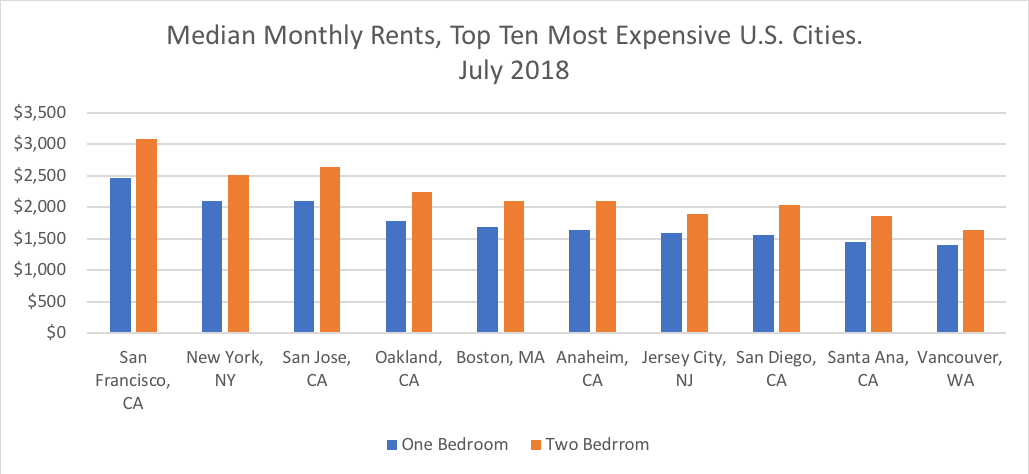My Rent Is Too High
Why renting a home is so expensive - A 5,000 Foot View.
I recently moved from a rather expensive neighborhood, Capitol Hill, in a relatively expensive city, Washington, D.C., to just outside San Francisco.
I really had no idea what expensive was.
I am currently renting a one-bedroom, one-bathroom apartment for $1,810, utilities included. Everyone I know out here assures me “it’s a steal.”
That’s because San Francisco tops the charts when it comes to outrageous rents, at an average of $2,458 per month for a one-bedroom apartment. But it’s no secret that housing in many of America’s cities is expensive, with the top ten all averaging well over $1,000 per month for a single-bedroom unit.

But why is the rent so high?
Well, put most simply, it’s a matter of supply and demand. Tons of people want to live in a certain area, but the housing supply is limited, so landlords can raise rents and lease to, effectively, the “highest bidder.” To lower prices, we need to increase the supply available.
If we need to increase the supply, why haven’t we?
Not everyone wants to increase the housing supply. Here are the hold ups:

1. The NIMBYs. NIMBY stands for “Not in My Backyard.” It describes residents who do not want to see the structure and culture of their neighborhoods affected by the introduction of high-occupancy housing, like apartment buildings, which can alter demographics, school districts, and traffic patterns. NIMBYs form coalitions to elect politicians that cement their preferences into law, and bureaucrats fill in the details with regulations and red tape.

2. Your landlord is rolling in it. Very little about the rent that you pay reflects the actual cost of housing you. But low supply raises the value of apartments, since so many people are battling for that one flat with the great layout, despite it being the size of a shoebox. Landlords take advantage of this competition by raising rents (making tons of money), and therefore, have an incentive to maintain this scenario through lobbying, voting, and donating.

3. Homeowners have bought into these artificially high prices, paying market rates for houses that would cost half the price just a few hours away. Many have mortgages from the original purchase or refinanced to take advantage of the increased value of their homes. If the housing supply grows, property values will decrease, reducing the net worth of homeowners.
To get affordable rent, we need more supply. It’s as simple as building additional housing, but first, we have to adjust regulations. Those who have benefitted from an artificially limited housing supply stand to lose when options are increased, but if we want to keep rental rates in line with reality, towns and cities must be allowed to grow with demand.
Catalyst articles by Ben Wilterdink | Full Biography and Publications
